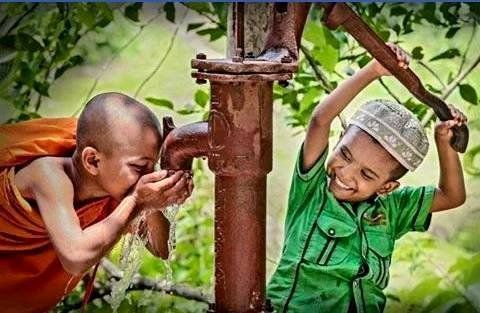In 1971, our forefathers fought against Pakistan and gave birth to Bangladesh. Through that liberation war, Bangladesh emerged as an ‘anti-thesis’ of Communal politics- practiced by the West Pakistan elites. Immediately after the liberation, Bangladesh based its constitution on nationalism, socialism, secularism, and democracy. Such spirit was not new for the Bengali nation. Instead, it was the implication of thousand years of practice of Bengali culture in this delta.
By Shafiqul Elahi
Besides state-level, Bengali society also practices harmony and tolerance. Perhaps, the mosque and temple share the same yard in Lalmonirhat or Feni, Buddhist men donating property to build a mosque, and sharing the joy of religious festivals are the shining examples of such claim. However, several attacks on minorities in recent times, and the spread of fanatic views on minority groups are putting strain on this rich tradition of communal harmony in Bangladesh. In this context, it is worth revisiting Bangladesh’s rich tradition and emergent challenges to communal harmony.
Bangladesh’s Communal Harmony
Communal harmony in this delta is vested within the Bengali nation’s peace-loving and accepting nature. This resulted in creating a constitution with the same spirit of secularism immediately after the independence. At present, religious minorities constitute about 12% of the current population of Bangladesh. Of these, Hindus constitute 10% of the population, Buddhists 1%, Christians 0.50%, and ethnic minorities less than 1%.
Despite a small percentage, minorities alongside the majority enjoy equal treatment in the eye of the state. Even though the article is using the binary terms ‘minority’ and ‘majority’ to provide an understanding, the state does not acknowledge it. It sees all as ‘citizens’, and facilitates accordingly.
For every religion, Bangladesh has dedicated legal frameworks for religious issues. Take for instance, Muslim marriage and inheritance law or Hindu marriage law. There are also arrangements under the law for people who do not identify with any religion.
The government also provides equal security for religious festivals. Government deploys extra security forces to ensure safety. Law Enforcement Agencies have also made it mandatory to install CCTV at the temples for better security. The latest ‘2022 Report on International Religious Freedom‘ report published by the US State Department acknowledged it also. The report also found that Bangladesh police have solved 105 religious cases out of 142 filed after the communal attack in 2021.
Besides the government’s efforts, the report also mentions the declining fatwa trend in Bangladesh. In the 1980s and 1990s, Fatwas given by local Clerics used to violate the human rights of common rural people. However, after the government’s banning and awareness campaign, the issue of fatwa has almost ended. Besides, the historic judicial statement on Burkha was also helpful in countering the spillover of global Islamophobia.
The US report also acknowledged the healthy interfaith harmony existing within the society. The report also acknowledged one interesting aspect of communal harmony in Bangladesh. According to the report, the Christian Mission is the second-largest contributor to Bangladesh’s education after the government with 270 educational institutions. And students attending these institutions come from diverse religious backgrounds.
The report also highlighted that even though the law doesn’t permit making special arrangements in prison during religious festivals, our prison management makes special arrangements on such festivals traditionally. For instance, the rich food provided in prison on Eid day is out of scope in existing law, but the authority provides so honoring the tradition and goodwill.
Not only the latest US report, but Pope Francis also lauded Bangladesh for upholding religious and communal harmony. The Holy Papal appreciated Bangladesh’s interfaith harmony and cultural diversity in 2017 during his visit to Bangladesh.
Challenges to Communal Harmony
Perhaps, the ‘rumor-instigated attacks on temples’ are the biggest concern for Bangladesh’s communal harmony. During the religious festivals, fanatics and extremists spread rumors on social media about potential blasphemy that enrages the common people resulting in violence and attacks on minority people. The attack on the Buddhist Community in Ramu in 2012, the attack on the Hindu Community in Cumilla in 2021, and the Nasirnagar incident of 2016 are some of the incidents that put a strain on Bengali’s thousand years of practice. To avoid further incidents, the government is relying on rounding-up security during religious events and installing CCTV- an effort that the US report acknowledged.
Besides violent attacks, fanatic quarters often feed hate speeches that adversely affect the social fabric. The mob attack against the Ahmadiyya community is also another concern for Bangladesh’s communal harmony. Home-grown Islamist Terrorism also posed a serious challenge but now it has been curbed thanks to the government’s counter-terrorism effort.
Besides the fanatic quarters and extremist factions, the spillover effect of communal and ethnopolitics in South Asia also plays an important role in putting strain. The communal violence in India, Myanmar, and Sri Lanka affects the sentiment of our common people. Fanatic quarters take advantage of this situation and exploit their emotions.
In the 21st Century, social media also has a significant role in either preserving or harming Communal harmony. The ‘Viral Culture’ and easy manipulation of these platform makes it easier for the fundamentalists to spread rumor, misinformation, and communal propaganda. Even though the government has mentionable effort to curb it, it is not possible without the cooperation of social media corporates.
The society also shares a responsibility in this regard. Both on individual and collective levels, we must make rational decisions before taking any decision. Otherwise, we will only become a pawn for fundamentalist politics. Our goal should be moving towards a more tolerant and harmonious society, preserving our spirit of secularism and cultural diversity.
Shafiqul Elahi is a Retired Government Official of Bangladesh










